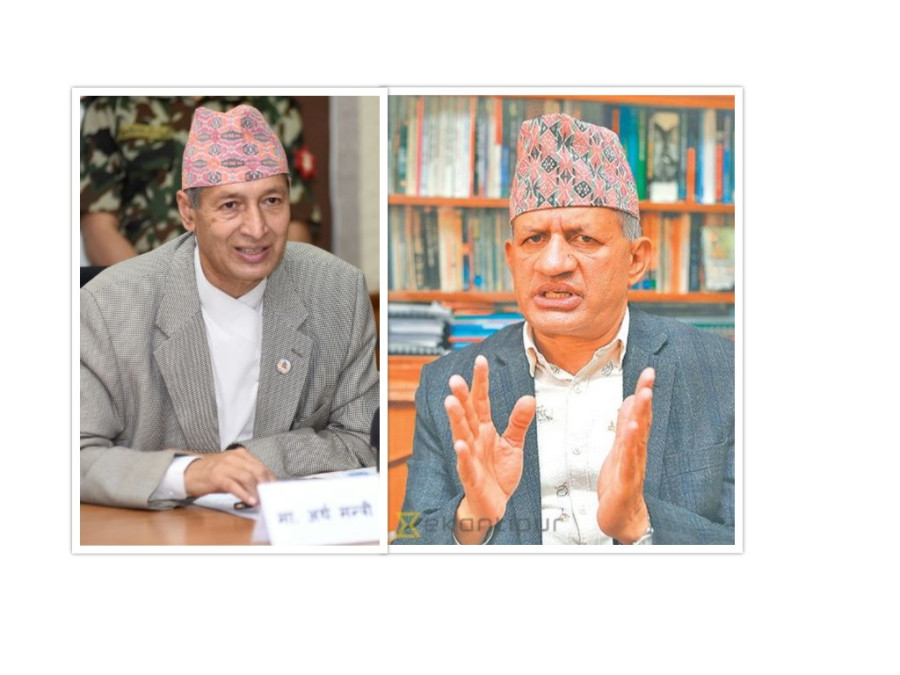National
Finance Ministry wants to cut down on Nepal’s embassies abroad. Foreign Ministry disagrees.
A task force formed to review the number of diplomatic missions abroad has been delayed over differences between the two ministries.
Anil Giri
Last year, in a bid to cut down on expenses and streamline work, Finance Minister Yubraj Khatiwada announced a review of all of Nepal’s embassies abroad. Subsequently, in November, Foreign Minister Pradeep Gyawali announced the formation of a task force to evaluate all embassies and their scope of work and gave the team three months to submit its report.
But nine months since, the task force, led by former ambassador Rudra Nepal, has held just three meetings, with no clear timeline on when the report will be formulated, according to a member of the task force. The primary reason for the delay appears to be differences between the Finance and Foreign ministries.
“Ambassador Nepal has left for the United States so we are not sure when the next meeting will take place,” the task force member told the Post on condition of anonymity as only the coordinator is allowed to speak to the media.
The task force includes representatives from the Finance Ministry, the Foreign Ministry and the Institute of Foreign Affairs, and is headed by Nepal, who was the ambassador to Australia. But multiple officials from the Finance Ministry and Foreign Ministry told the Post that the task force has not been able to work effectively due to differences between the two ministries over reducing the number of Nepal’s missions abroad.
“As soon as the task force was announced, Foreign Ministry representatives came up with a position paper that only called for the closure of a few missions, arguing that opening new missions while shutting down others would send the wrong diplomatic message,” said another member of the task force.
The Finance Ministry, however, is in favour of closing at least half a dozen Nepali embassies, as outlined in reports from the ministry itself.
“We always stand for cost-cutting measures. We favour austerity,” said Uttar Kumar Khatri, the spokesperson for the Finance Ministry, adding that he cannot comment until final reports come up and asked to reach out to the Foreign Ministry for the latest developments.
Khatiwada’s May 2018 announcement was in line with the first policies and programmes of the KP Sharma Oli administration, which was determined to cut down the numbers of Nepali missions abroad. The reason boiled down to four objectives: these missions should promote Nepal’s interest, tourism development, create a favourable environment for export, and inject more foreign investment in Nepal.
According to officials, the plan was an austerity measure to reduce financial burdens on state coffers while also closing down Nepali embassies that were not functioning in line with the administration’s policies.
Nepal has six consulate general offices and 33 embassies, including three permanent missions to the United Nations—in New York, Geneva and Vienna. The budget of the Foreign Ministry is currently around Rs2 billion—or 0.51 percent of the total national budget—with most of the funds allocated to renting offices, chanceries and residences for Nepali missions abroad. Nepal spends around Rs800 million on the operation of its embassies around the world.
Former diplomats, however, caution against any new move regarding Nepal’s embassies.
Durga Prasad Bhattarai, a former foreign secretary and ambassador to the United Nations, said that diplomatic missions are good for the country as such embassies will help establish Nepal in the host countries, but the government should be cautious while taking a decision on increasing the number of such offices.
“The performance of missions should be reviewed periodically so that we know which missions we need,” Bhattarai told the Post. “We’ve failed to assign a mandate to the embassies and failed to monitor their objectives. But we should stop thinking in the short term. We need to think and set a target for 25 years so that we can identify our needs, requirements and planning.”
As per the Finance Ministry’s assessment, Nepal’s missions in Spain, Brazil, South Africa, Canada, Austria and Denmark could either be closed down or their scope of work relocated to nearby embassies. Apart from Brazil, none of these host nations has opened up their own missions in Kathmandu on a reciprocal basis.
Even a high-level task force report, submitted by Prof Sridhar Khatri in February 2018, had recommended a review of the number of Nepali missions abroad after assessing their work.
“There doesn’t seem to be much rationale behind the Nepali embassies in Sri Lanka and Myanmar but there are other avenues, like Singapore, where Nepal should open up a new mission,” said Nischal Nath Pandey, who was a member of the Khatri task force, formed by the Foreign Ministry in 2017.
“It is not that once an embassy is established, we do not need to review its effectiveness,” said Pandey. “After all, its taxpayer money.”
***
What do you think?
Dear reader, we’d like to hear from you. We regularly publish letters to the editor on contemporary issues or direct responses to something the Post has recently published. Please send your letters to [email protected] with "Letter to the Editor" in the subject line. Please include your name, location, and a contact address so one of our editors can reach out to you.




 15.12°C Kathmandu
15.12°C Kathmandu















